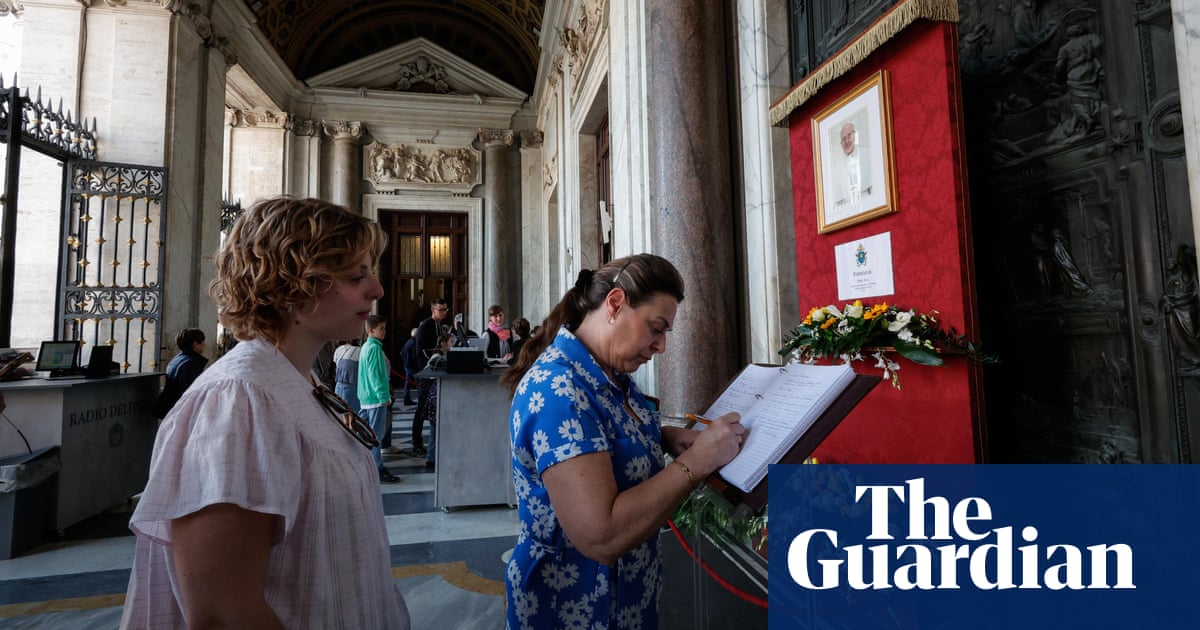Bill Nicoletti and his family, from Philadelphia, were among the thousands gathered in St Peter’s Square for Easter Sunday mass whenPope Francisarrived in his open-air popemobile.
The vehicle cruised through the square, stopping occasionally for the pontiff to bless babies that were brought towards him, as the delighted crowd shouted “Viva il papa! (long live the pope!)”.
At the end of the mass,Francis appeared from the central balcony of St Peter’s Basilica to wish the crowd a happy Easter and give a blessing. He looked frail, and struggled to speak. His brief Easter message, which was read aloud on the balcony by an aide, reiterated his call for an immediate ceasefire in Gaza.
The next morning, Francis, 88, was dead.
“I was so caught up in the moment that I didn’t think of his illness,” said Nicoletti, who returned to St Peter’s Square to pay his respects on Monday. “Then when my daughter called me this morning to say he had died, I was very surprised. To me it feels like it was a divine intervention – God wanted him to live until Easter, and then he left. It was a joyous day. I now feel sad but also moved to be here for his historic moment for the [Catholic] faith.”
Francis died on Monday while convalescing after a severe bout of pneumonia.Cardinal Kevin Ferrell, the Vatican camerlengo, will preside over the rite of the certification of death and the placing of the pope’s body in a coffin in the chapel of the pontiff’s home at Casa Santa Marta at 8pm CET on Monday. The pope’s remains will be transferred to St Peter’s basilica on Wednesday, when the public will be able to pay tribute.
As of Monday night, the date of his funeral had not been announced but papal funerals usually take place between four and six days after death. The canonisation of the Catholic church’s first millennial saint, Carlo Acutis, which had been scheduled for 27 April, has been suspended.
Nicoletti, who also saw Franciswhen he visited Philadelphia in 2015, was among the thousands of pilgrims and tourists mourning the pope at St Peter’s Square. At around midday, the bells of the basilica rang out and the square fell almost silent.
Father Jacopo Aprico was visiting Rome with a group of schoolchildren from Milan. They heard the news that the pope had died when they were on the train.
“His death was expected because he had been so ill, but we were still surprised,” said Aprico. “He was only in this square yesterday. It is sad – you can never be prepared for someone’s death, regardless of how old or ill they might be.”
Wilder Herrera was in Rome with his girlfriend, both from Colombia. He recalled seeing Francis, originally from Argentina, when he visited his hometown, close to Bogotá, in 2017. “We wanted to pay our respects,” said Herrera. “Francis was a great pope, someone who was very humble and close to the people,” said Herrera.
Alice and her family were in Rome for the Easter weekend from Catania in Sicily. “It feels as if he wanted to wait for Easter Sunday to give his blessing and say goodbye,” she said. “Then he left us for heaven.”
Francis, who almost died twice during his five-week hospitalisation, was discharged from Rome’s Gemelli hospital on 23 March and ordered by doctors to rest at home for at least two months. Although his official work duties were vastly scaled back, he madeseveral appearancesin recent weeks, the most daring being a visit to St Peter’s basilica, wearing a poncho-like top and black trousers, in order to thank the restorers finishing up the restoration of the 17th century tomb of Pope Urban VIII.
He alsoprivately metKing Charles and Queen Camilla during their recent state visit to Italy and on Maundy Thursday kept up the tradition of visiting inmates at Rome’s Regina Coeli prison.
One of the last people to see him was the US vice-president, JD Vance, who was in the Italian capital for the Easter weekend andmet Francison Easter Sunday morning, an encounter that was not previously scheduled.
Francis hadalways pushed the limits throughout his 12-year papacy, so that he ventured out despite still being ill was not surprising.
He had embarked on more than 40 overseas trips during his time as pontiff, the longest and most arduous one being his four-country tour of Asia last September. His final overseas trip was to Corsica in December. Later that month he opened the Catholic Jubilee, a special year of forgiveness and reconciliation during which millions will travel to Rome, and maintained an intense schedule before being hospitalised in mid-February.
Francis simplified rites for papal funerals last year and previously said he had already planned his tomb in the basilica Santa Maria Maggiore in the Esquilino neighbourhood in Rome, where he went to pray before and after trips overseas. Popes are usually buried with much fanfare in the grottoes beneath St Peter’s Basilica inVatican City.
Amid intense mourning over the coming days and weeks, manoeuvring within theVaticanover who will succeed Francis will begin, with a conclave needing to get underway within 20 days of the pope’s death.
Mourners in St Peter’s Square are also contemplating his successor. “I hope the next pope will be a continuation of Francis’ papacy,” said Nicoletti.
